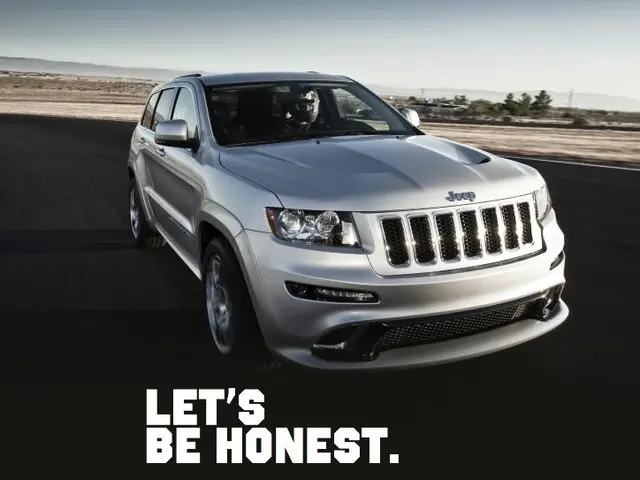Electric Vehicles and Tariffs Grab Attention as Chinese Car Manufacturers Dominate Shanghai Motor Show
Revved Up in Shanghai: The world's largest car market is bustling with leading automakers showcasing their latest designs-for-China and international models at the Shanghai Auto Show this week. As the global trade war continues, these automakers strive to secure their position in the world's largest auto market.
The Shanghai Auto Show, held in the industrial outskirts of Shanghai, comes at a crucial moment, three decades after China's bid to build a world-class auto industry took off. Domestic manufacturers now account for approximately two-thirds of sales within China, and an increasing share of global exports.
Yet, as the US President Donald Trump imposes tariffs and the European Union adds duties on Chinese electric vehicles, overseas sales become increasingly challenging. Wei Jianjun, chairman of Great Wall Motors, expressed the uncertainty, stating, "Geopolitics are complex, and the situation remains uncertain, but Great Wall is always exploring investments in overseas markets." The exhibition, consisting of two media days, two trade days, and a public opening on Sunday, runs until May 2.
Electrics Rule the Road: Encouraged by government incentives for replacing older vehicles with the latest models, Chinese drivers have wholeheartedly embraced the switch to electric vehicles. Sales of battery-powered and hybrid vehicles surged by 40% last year. In total, 31.4 million vehicles, including buses and trucks, were sold last year in China, a 4.5% increase compared to the previous year, according to the China Association of Automobile Manufacturers.
China, the world's biggest market by sales, experienced growth in electric vehicle sales offset by declining sales of traditional gasoline and diesel-powered vehicles. Chinese electric vehicle maker BYD outpaced Tesla as the world's top electric vehicle manufacturer by sales last year, generating over $100 billion in revenue. BYD recently announced an extraordinary fast EV charging system, capable of providing a full charge for its latest EVs within 5 to 8 minutes—similar to the time needed to fill up at the pump. They plan to establish over 4,000 of these charging stations across China.
The Fight for Survival: To penetrate China's enormous market, foreign automakers like Volkswagen, General Motors, BMW, and Ford partnered with state-owned local companies in the 1980s and 90s, aiding them in building capacity and technology to compete on a global scale. They simultaneously created sprawling supply chains in Shanghai and other significant manufacturing hubs, nurturing other key Chinese brands such as BYD, Geely, and Great Wall Motors.
Unfortunately, growth within China is limited by intense competition. These global players are rapidly expanding into Southeast Asia and other developing economies, offering affordable sedans, SUVs, and pickup trucks. Shanghai's auto show is a battleground for the "survival of the fittest," said Zhou Lijun, director and chief researcher of the Yiche Research Institute.
Challenges Ahead: Chinese and foreign automakers remain hopeful about the Chinese market, despite the potential barriers such as tariffs. "China is still worth fighting for," stated Oliver Zipse, chairman of the BMW Group. Major international players like Nissan, Toyota, and VW face tough battles in China as they fight a war of attrition.
US and European tariffs on foreign-made electric vehicles are prompting Chinese newcomers to shift production closer to those markets, as more Western consumers choose the latest Chinese models. While the trade war between China and the United States may obstruct direct exports from China to the United States, it does not prohibit local production there or the establishment of global production bases in Europe or elsewhere, discussed Zhou.
A report by the Rhodium Group revealed that nearly half the world's markets restrict imports from China, primarily due to national security concerns related to the advanced electronics in EVs and other high-tech vehicles. A few countries, like Australia and South Africa, remain relatively open, while Russia serves as a significant market but is nearing saturation.
The Future of Chinese Automakers: Chinese automakers lag behind global leaders in conventional gasoline and diesel-powered vehicles, but they can sell electric vehicles at roughly the same price, while also resolving range and fast-charging issues. China has become part of a major "technological paradigm shift," as automakers in China transition towards electric vehicles as a route to "technological and industrial dominance."
Chinese electric vehicle manufacturers like BYD, benefiting from a lack of significant legacy operations, can quickly adapt to market demand and customer preferences. Stefan Sielaff, vice president of global design for EV maker Zeekr Group, says, "They can react very fast to market demand and deliver extremely quickly." Founded in 2021, Zeekr is selling cars in more than 80 markets, including Europe.
- The Shanghai Auto Show, showcasing the latest car designs, runs until May 2 in the industrial outskirts of Shanghai, a significant moment as China's auto industry progresses three decades since its inception.
- Encouraged by government incentives, Chinese drivers have enthusiastically embraced electric vehicles, with sales surging by 40% last year.
- Chinese electric vehicle manufacturer BYD, generating over $100 billion in revenue last year, outpaced Tesla to become the world's top electric vehicle manufacturer.
- To penetrate China's colossal market, foreign automakers like Volkswagen, General Motors, BMW, and Ford partnered with local companies in the 1980s and 90s, aiding them in building capacity and technology.
- Global players are rapidly expanding into Southeast Asia and other developing economies, offering affordable cars, including sedans, SUVs, and pickup trucks.
- Despite potential barriers such as tariffs, Chinese and foreign automakers view China as worth fighting for due to its enormous market size.
- US and European tariffs on foreign-made electric vehicles are causing Chinese newcomers to shift production closer to those markets to cater to Western consumers.
- Chinese automakers, such as BYD, can quickly adapt to market demand and customer preferences due to a lack of significant legacy operations, allowing them to rapidly develop and sell electric vehicles in more than 80 markets, including Europe.








